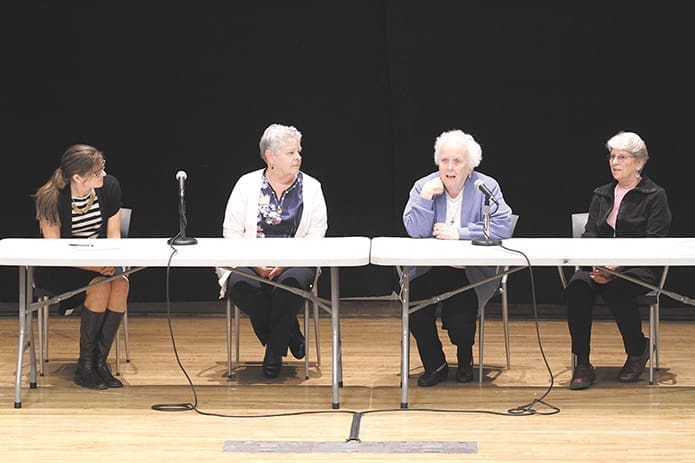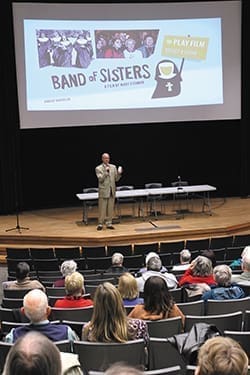 Photo By Michael Alexander
Photo By Michael AlexanderAtlanta
Film profiles sisters’ work among poor, homeless, imprisoned
By NICHOLE GOLDEN, Staff Writer | Published December 6, 2013
ATLANTA—The documentary “Band of Sisters” opens with two headphone-wearing nuns fielding questions from listeners about the lives of women religious and the Catholic faith.
“Podcasting live from the convent,” says the announcer.
The Aquinas Center of Theology at Emory University in Atlanta featured the film “Band of Sisters” at a Nov. 12 screening in the auditorium of Goodrich C. White Hall.
The documentary, by producer and director Mary Fishman, was an official selection at the Milwaukee, Cape Ann, Athena and St. Louis International Film Festivals.
The film chronicles the stories of several American sisters from various congregations and their work in social justice since the Second Vatican Council.
Aquinas Center Director Dr. Phillip Thompson introduced the film saying the center’s goal is to present programs representing the “breadth and depth” of the Catholic intellectual community.
Following the film screening, a panel of “three live sisters,” as described by Dr. Thompson, took questions from the audience about their work.
The 88-minute documentary blends historical photos of American sisters in traditional habits with modern day interviews and studies of their work in immigration, the offering of low-income housing, peace efforts, and even in organic farming.
Sister Yolanda Tarango of the Sisters of Charity of the Incarnate Word was one of several interviewed. Sister Yolanda said she grew up wanting to be “anything but a nun.”
However, she did become one, drawing from her own life experiences growing up in a minority community. Sister Yolanda has worked for more than 25 years in a program called Visitation House in Texas helping homeless, single mothers.
Sister Nancy Sylvester, of the Immaculate Heart of Mary Sisters, said she wanted to do two things as a young girl. “I wanted to love God and I wanted to be perfect,” she recalled on camera. And for a Catholic girl in 1966, that meant becoming a sister. “So I did,” she said.
She has served in leadership for Network, a Catholic social justice lobby and as president of the LCWR, the Leadership Conference of Women Religious.
Two of the women prominently featured in “Band of Sisters” are Sisters of Mercy JoAnn Persch and Pat Murphy of Illinois. The filmmakers followed the pair as they worked to bring services to people being detained at and deported from the Broadview Immigration Detention Center in Chicago. Sister JoAnn and Sister Pat worked for passage of a bill to allow religious workers access to meet with prisoners inside the detention center. Before the passage, they were only allowed to pray outside the jail.
The film also focuses on the “universal call to holiness” by all the baptized, a teaching addressed in the documents of Vatican II written in the mid-1960s.
While some women left their congregations to live out this call in other ways, some shifted from a life of contemplation and prayer to working for social justice out in the world.
Sister Lillian Murphy of the Religious Sisters of Mercy, featured in “Band of Sisters,” said she believes American religious communities have all been “faithful to their foundresses’ intentions.”
As director of Mercy Housing, Sister Lillian has worked for years to provide affordable housing in hundreds of U.S. cities.
“We’re down there with the people. We know what their needs are,” she said about the work of women religious.

Dr. Phillip Thompson, director of The Aquinas Center of Theology at Emory University, makes some opening remarks before the showing of the 88-minute long “Band of Sisters” documentary at Emory University’s White Hall auditorium, Nov. 12. Photo by Michael Alexander
Following the screening, Dr. Marie Marquardt, scholar-in-residence at Emory’s Candler School of Theology, moderated a question-and-answer session with three sisters serving in Atlanta. Panel participants were Dominican Sister Mary Priniski, chapter prioress of the mid-Atlantic chapter of the Adrian Dominican Sisters; Sister Margaret McAnoy, IHM, vicar for religious for the Archdiocese of Atlanta; and Sister Jean Marie Lehtinen, an Adrian Dominican sister who recently moved to Alpharetta from the Diocese of Prince George in British Columbia, Canada.
The first question addressed by panel members was how they keep going in their daily work.
Sister Mary said she always keeps in mind the people who are hurting and need help. “If you give up, you give up on them,” she said.
Her additional daily inspirations are the other Dominican Sisters of Adrian. “They keep me going,” said Sister Mary.
Sister Margaret said the “women who’ve gone before me” are inspiring to her. She said that “Band of Sisters” featured interviews from both her novice master and a former student.
Sister Margaret focused on her own older sister, who was also a nun, while in formation. She thought, “If she can do it, I can do it.”
Each day and “to this day,” Sister Margaret has found the work rewarding.
“I’m sorry you can’t all enjoy it,” she said to the audience.
Sister Jean Marie, who will be focusing on recreating the Cedar Hill retreat center in Cumming, said every day is a “new” day.
“You just do what you are called to do,” she said.
Marquardt questioned the panel members about their current work. Sister Margaret joked about her job as vicar for religious.
“I have a title. I love titles,” she said. She often tells people “I’m just figuring it out myself.”
Sister Margaret serves as a liaison between the some 100 women religious in the archdiocese and Archbishop Wilton D. Gregory.
Sister Jean Marie, whose former work included outreach to street people in Canada, now will be using her talents to create a new vision for the Cedar Hill retreat center. “It needs some help,” said Sister Jean Marie.
One audience member questioned the nuns about how they determine their work, if they are assigned jobs or the calling just comes. Sister Mary said often it’s been a literal phone call for her providing guidance on what to tackle next.
“We haven’t been told what to do for a long time,” she said.
The sisters agreed that there will always be cloistered nuns spending a life in prayer for others, as well as sisters fulfilling their call in society.
Sister Mary said that sisters who left religious congregations after Vatican II, while not vowed members, are often serving their communities in other ways.
Bereit Reisenauer, working on a Catholic studies minor at Emory, asked the sisters if they thought the message of the Gospel was being replaced by “buzz words,” including social justice.
Sister Margaret said that she feels Jesus Christ more present in her life today than when she was “praying all day as a novice.”
Sister Mary mentioned that the idea of social justice and helping others in need is very evident in St. Paul’s Letter to the Hebrews and throughout the New Testament.
“Social justice is not a buzz word,” she said. “This is also part of what the Scripture says.”
For details on the documentary film “Band of Sisters,” visit www.bandofsistersmovie.com.